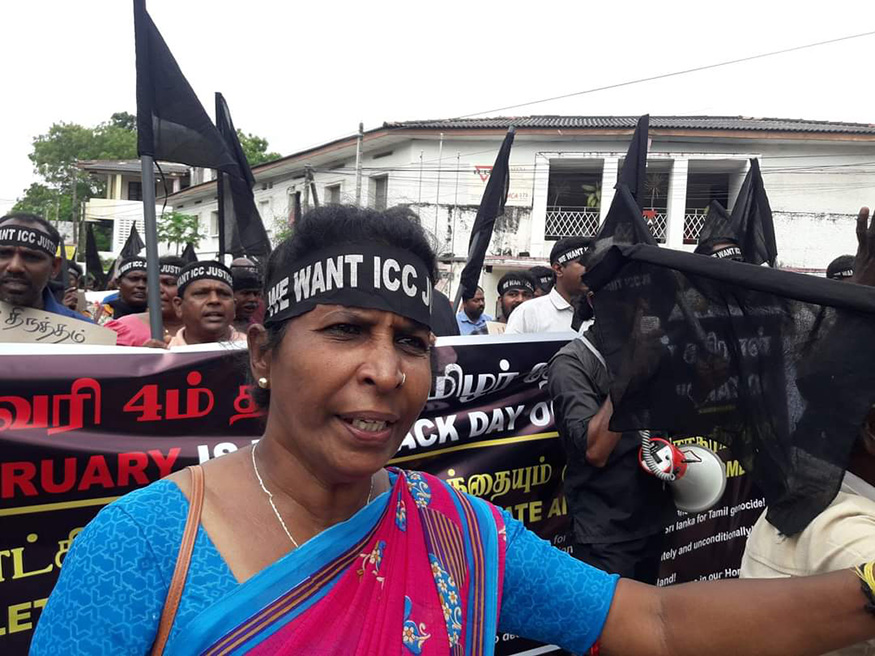2024 Gwangju Prize for Human Rights Winner Introduction

Suganthini Thangarasa was born on 01 December 1968 in Kokuvil, a village in Jaffna district in the Tamil speaking North and East of Sri Lanka at a time when the Tamil people have been going through decades long oppression and heavy militarization by the Sinhala-dominated Sri Lankan state
As she grew up, she continuously witnessed countless atrocities committed against her people by the state security forces through land grab, arrests, torture, enforced disappearances, and mass killings, particularly sexual violence against the Tamil girls and women.
Her husband, who was an English teacher, was murdered by the Sri Lankan military, and she has since raised her child as a single mother. She lives with her daughter, her mother, and two adopted daughters who lost their parents during the war.
Along with thousands of young men and women Suganthini, as a young woman embraced the spirit of freedom and committed herself to the freedom of her people and homeland as well as women.
However, their non-violent protests against human rights violations committed against the Tamil people were mercilessly suppressed by government security forces over the course of three years.
Suganthini has been a leader in Tamil women's empowerment since 1987. She has been campaigning against the caste system, dowry, and domestic violence for more than two decades in her quest to regain people's land from the Sri Lankan security forces. In 2002, during the peace process between the Sri Lankan government and the Tamils, she spoke to many European delegations about the pain and suffering of women in the region. The peace process was designed to resolve the twenty years military conflict and to end the continued repression against the Tamils. Additionally, it was during these initiatives that women like Suganthini became more visible. However, in the same year, the peace process was dissolved as the US and UK attempted to fulfil their geopolitical interests in the Indian Ocean region, and in 2007 war between the Tamils and the Sri Lankan government erupted.
On May 18, 2009, the war ended with the Sri Lankan government declaring victory over the Tamils. Tamils commemorate May 18 as Mullivaikkaal Memorial Day. Mulllivaikkaal is the location of the final massacre in 2009 but is currently used to refer to all massacres against Tamil in the country from 1950, as a whole.
The United Nations has reportedly estimated that at least 70,000 people were murdered in the final phase of the war between 2007 and 2009. Furthermore, at least 146,000 people were missing ("disappeared") over this period, a report by Rev. Joseph Rayappu, the Roman Catholic Bishop of Mannar, stated. As the entire Tamil Eelam was devastated, Suganthini, along with hundreds of thousands of other displaced people, moved on foot for days without water and food into areas controlled by the Sri Lankan government.
Suganthini was illegally detained in the infamous Pampaimadu concentration camp in October 2009, where she was raped and tortured on multiple occasions and kept blindfolded for most of her imprisonment.
On April 10, 2012, the Sri Lankan judiciary found Suganthini not guilty of all charges brought against her by the Sri Lankan security forces and was released from detention. Since then, Suganthini has settled in the Jaffna district and founded Amara in 2012 with other war-affected women to promote the human rights of women living under the complete control of the Sri Lankan military. Amara continues to diligently participate in an unstoppable struggle to achieve dignity.
When Amara began, it had around two dozen members, but over the years, it has expanded to 2,637 members in 40 Grama Niladhari (the smallest administrative unit in Sri Lanka). Different from other NGOs, Amara is a grassroots organization that does not have an office. Suganthini and Amara call for justice for the atrocities perpetrated by the Sri Lankan government against the Tamil Eelam, reveal the truth of the genocide, and persistent abuses against the Tamil. They continue to demand an international investigation.
Suganthini has delivered testimonies in venues such as at the People's Tribunal on Sri Lanka in Berlin in May 2022, convened by the Permanent People's Tribunal headquartered in Rome. She organized protests and publicly spoke out about the brutalities committed by the military despite facing constant military surveillance, harassment, pressure, and threats. She has been a model of courage and hope for many other women who have lost all aspects of their daily lives to the Sri Lankan military.
Suganthini famously said: "When one individual demonstrates courage, it inspires others. I want to be such a person. I can't share with my daughter what they did to me in detail during my detention by the military, but I'll continue to fight so that the next generation of women will not have to suffer the same way."


